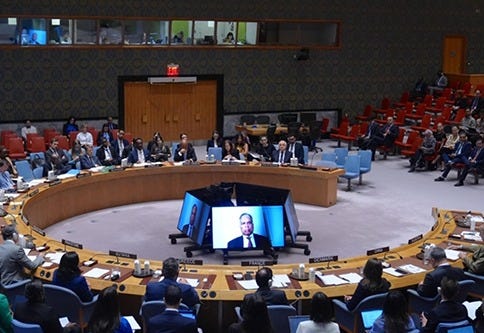At the United Nations Security Council this week, something rare happened. China, Russia, the UK, and France, four permanent members who often clash on everything from Ukraine to trade, stood together to condemn Israel’s plan to seize control of Gaza City.
The plan, approved by Netanyahu’s security cabinet, would force up to 800,000 Palestinians from Gaza City into already overcrowded refugee zones by October 7. UN officials warn this would be another mass displacement, potentially on the scale of the worst 20th-century war crimes.
Yet, in a chamber where nearly everyone demanded Israel stop, one seat remained firmly in opposition: the United States. Acting U.S. Ambassador Dorothy Shea defended Israel’s “right to self-defense,” dismissed genocide accusations as “obviously false,” and criticized fellow Council members for “pressuring” Israel.
The U.S. veto power means that no matter how united the rest of the Security Council is, Israel faces no binding consequences. This is not new. Washington has shielded Israel from UN censure for decades. This moment is different. The other four permanent members are united, and several of America’s closest allies, including Germany, Spain, and Ireland, are also breaking ranks.
Who stood where
Condemning Israel’s plan:
China
Russia
United Kingdom
France
Germany
Spain
Ireland
Denmark
Greece
Slovenia
Luxembourg
Malta
Norway
Portugal
Iceland
Supporting or defending Israel:
United States
For Americans, this is a mirror. The rest of the world is telling you that what your government is enabling is wrong. Your allies are telling you. International law is telling you. Humanitarian organizations are telling you. If nothing changes, the humanitarian disaster in Gaza will deepen, and the U.S. will be remembered as the one country that had the power to stop it but chose not to.
You have more leverage than you think. Elected officials respond to public pressure, especially when it risks their political future. Contact your representatives. Support organizations pushing for an end to forced displacement. Refuse to accept the framing that this is “self-defense” when civilians are starved and driven from their homes.
The U.S. is not the world. When Washington acts alone to block accountability, it drags the whole country’s reputation with it. That will not be forgotten.
What happens next
Mid-August: Israel is expected to finalize operational plans for the Gaza City takeover.
Late August to September: Humanitarian agencies warn that mass displacement preparations will begin, with residents pressured or forced to move.
October 7 deadline: The Israeli plan aims to complete the evacuation before this date, marking one year since the 2023 Hamas attack.
Ongoing: U.S. diplomatic protection ensures no binding UN resolution will pass without American support.
This timeline is not set in stone. Public pressure, especially inside the U.S., can still change the political cost of moving forward. The choice is whether to act before the October deadline or to explain afterward why nothing was done.










